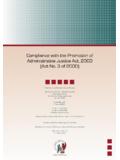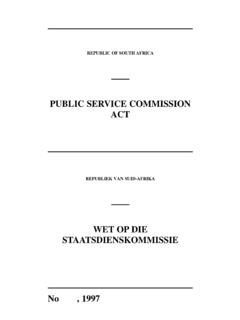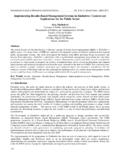Transcription of INTEGRATED RISK MANAGEMENT IN THE PUBLIC …
1 PUBLIC SERVICE COMMISSION. INTEGRATED RISK. MANAGEMENT IN THE PUBLIC . SERVICE. A Provincial Perspective LIMITATIONS ..4. EXECUTIVE SUMMARY ..6. CONCEPTUAL 1. LEGISLATIVE FRAMEWORK ..9. 2. 3. RISK CATEGORIES ..10. 4. RISK 5. RISK MANAGEMENT WITHIN THE Context OF THE PUBLIC SERVICE 6. RISK MANAGEMENT WITHIN THE CONTEXT OF THE PUBLIC FINANCE MANAGEMENT . ACT (PMFA) AND THE TREASURY REGULATIONS ..11. 7. BEST PRACTICES APPROACH TOWARDS RISK MANAGEMENT IN THE PUBLIC SERVICE..12. PROVINCIAL PERSPECTIVE ..13. 8. 9. PROVINCIAL COMPLIANCE OVERVIEW ..13. 10. EASTERN CAPE PROVINCIAL 11. NORTHERN CAPE PROVINCIAL ADMINISTRATION ..16. 12. WESTERN CAPE PROVINCIAL 13. MPUMALANGA PROVINCIAL ADMINISTRATION.
2 20. 14. KWAZULU NATAL PROVINCIAL ADMINISTRATION ..21. 15. FREE STATE PROVINCIAL 16. LIMPOPO PROVINCIAL ADMINISTRATION (formerly Northern Province).. 27. 17. CONCLUSION 29. 18. QUESTIONNAIRE 31. 2. TERMS OF REFERENCE. INTRODUCTION. The South African Constitution, inter alia, entrusts the PUBLIC Service Commission with the task of monitoring and promoting a high standard of professional ethics in the PUBLIC service. Accordingly, the PUBLIC Service Commission, as part of its Strategic Plan for 2001/02, undertook to: ! Promote awareness amongst Senior MANAGEMENT in particular and Supervisors in general on the utilisation of Risk MANAGEMENT Tools as part of their daily MANAGEMENT activities to- Improve service delivery by the effective utilisation of resources and appropriate contingency planning processes; and Timeously implement cost effective corrective measures to ensure compliance with output and time requirements as set out in approved Strategic, Implementation and Work Plans.
3 Prevent fraud and corruption. ! Determine the application status of Risk MANAGEMENT practices in selected Provincial Administrations. ! Identify systemic gaps regarding the application of Risk MANAGEMENT and to recommend appropriate corrective action. METHODOLOGY/APPROACH. During the phase of determining the detailed terms of reference, it was agreed that the enhancement of awareness and status diagnosis would simultaneously be conducted through cross-departmental consultative workshops in the following Provinces- Eastern Cape Northern Cape Western Cape Mpumalanga 3. KwaZulu Natal Free State Limpopo Province (formerly Northern Province). The consultative Workshops were structured to provide participants with: A theoretical overview on the application of Risk MANAGEMENT principles and practices as it relates to- !
4 INTEGRATED strategic, operational and work planning processes established by means of the PUBLIC Service Regulations ( PUBLIC Service MANAGEMENT Framework); and ! Compliance with the imperatives of the PUBLIC Finance MANAGEMENT Act, 1999, (PFMA) and general MANAGEMENT practices. An opportunity to gain experience from good practices elsewhere in the PUBLIC Service. Following a desk analysis of developments within provinces, the structural and systematic arrangements already made by Gauteng, KwaZulu Natal and to a lesser extent the North West Province were identified as possible best practices . A partnership was therefore established with the Head of the KwaZulu Natal Internal Audit Service Centre who shared their implementation experience at all the workshops with other provinces.
5 Relevant material on best practices utilised elsewhere in the world;. An opportunity to conduct, by means of a small group exercise, a risk assessment and intervention strategy design exercise; and An opportunity to reflect on in house experiences and the level of institutionalisation. A desk study of relevant legislation, literature and documents provided by the Provincial Administrations also informed the workshop approach and report content. Heads of Provincial Departments and Senior Managers were targeted for participation in the Workshops with the view to- Establish awareness and buy in at strategic level; and Ensure that the utilisation of Risk MANAGEMENT Tools is cascaded down in Departments by means of leadership initiatives.
6 LIMITATIONS. Attendance of Provincial Heads of Department and Senior Managers, in the majority of instances, was unsatisfactory. This unfortunately affected the quality of 4. information on the levels of institutionalisation and relevant implementation barriers. SCOPE. The report is divided into four parts, namely: a) Executive Summary A general status overview, identified implementation barriers and recommendations dealing with transversal matters are discussed in this part. b) Risk MANAGEMENT : Conceptional Framework The application of Risk MANAGEMENT within the context of PUBLIC administration is assessed. c) Risk MANAGEMENT : Provincial Perspective Implementation of Risk MANAGEMENT in the Eastern Cape, Western Cape, Northern Cape, Free State, KwaZulu Natal, Mpumalanga, Limpopo Province (formerly Northern Province) are discussed.
7 D) Distribution of the report and Questionnaire on use of report. The report will be distributed within the PUBLIC service to key stakeholders. The report will also be available on the website of the OPSC and a direct e-mail link will enable the reader and user of the report to electronically comment on the report. A questionnaire has been included at the back of the report. The purpose of the questionnaire is to get an impression of the practical value the report has for PUBLIC servants. It provides valuable feedback to the Office of the PUBLIC Service Commission on the contents; structure and possible impact the report might have for the users of the report.
8 An honest opinion of the reader and user of this report will greatly contribute to improving the service, which the Office of the PUBLIC Service Commission renders to stakeholders and the PUBLIC service in general. It is included as a page to be torn out easily, perforated and glued and addressed to the OPSC. with the postage already paid. 5. PART A. EXECUTIVE SUMMARY. 1. Introduction The purpose of this report is to: Report on an initiative launched by the PUBLIC Service Commission to increase awareness levels on INTEGRATED Risk MANAGEMENT in selected Provincial Administrations;. Highlight the implementation barriers affecting the integration of Risk MANAGEMENT practices in the strategic planning processes and the day-to-day operational MANAGEMENT of Departments in selected Provinces; and Make recommendations to overcome the identified implementation barriers.
9 Consultative one-day Workshops were conducted in the Eastern Cape, Northern Cape, Western Cape, Mpumalanga, KwaZulu Natal, Free State and the Limpopo Province (formerly Northern Province), targeting Heads of Department and Senior Managers to, inter alia, promote awareness on Risk MANAGEMENT and elucidate information for this report. 2. Consultative Workshops A total number of 224 Senior and Middle MANAGEMENT officials attended the seven workshops. Unfortunately, only three Provincial Directors-General and nine Heads of Department attended the workshops. Provincial officials presented attendees of the workshops with an overview of the progress made with the implementation of Risk MANAGEMENT strategies in the various provinces.
10 Participants were provided with: A short theoretical framework on Risk MANAGEMENT practices based on the INTEGRATED framework developed and adopted by the PSC;. An overview of the KwaZulu Natal implementation experience;. An opportunity to reflect on own experiences vis-a-vis the KwaZulu Natal experience;. An opportunity to discuss the relevant provincial barriers; and Relevant reading material. Eighty seven percent of the participants indicated that they found the workshop very useful whilst 13% of the participants indicated that they found the workshop useful . 6. Seventy-six percent of the participants indicated that the Workshop provided them largely with a better understanding of Risk MANAGEMENT practices; while the remainder of the participants indicated that their understanding had improved partially.












